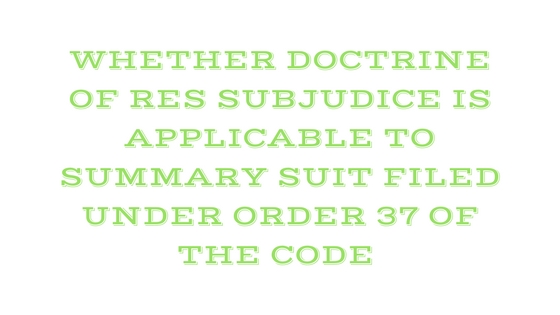Aapka Consultant Judgment Series- In this series, we are providing case analysis of Landmark Judgments of Hon’ble Supreme Court of India.
Indian Bank v. Maharashtra State Co-operative Marketing Federation Ltd.AIR 1998 SC 1952, [1998] 5 SCC 69
JUDGES: S.C. Agrawal and G.T. Nanavati
Date of Decision: 05-05-1998
FACTS:
Here, the respondent-Federation applied to the appellant Bank to open an Irrevocable Letter of Credit. Pursuant to that, the appellant forwarded the same to the respondent for their acceptance. Later, the said amount of credit has become irrecoverable. The appellant filed the summary suit before the High Court under Order 37 of CPC. The respondent took out Notice of Motion seeking stay of the summary suit on the ground that it has already instituted a suit against the bank for recovery of outstanding credit prior to the filing of the summary suit but same has been disposed and dismissed by Single judge bench. Aggrieved by the order, respondent filed appeal before Division Bench and consequently, stayed summary suit on the ground the word “trial” in S. 10 has been used in a wider sense and applied to summary suits. In result, the impugned order of the Division Bench was challenged in the Supreme Court.
ISSUE:
Whether the bar to proceed with the trial of subsequently instituted suit, contained in Section 10 of the CPC, 1908(hereinafter referred to as the ‘Code’) is applicable to summary suit filed under Order 37 of the Code?
JUDGMENT:
According to the learned counsel for appellant, the purpose behind the introducing separate provision of summary suits would be frustrated if S. 10 applied to the suits of summary nature.
The provision under S. 10 of the CPC disallows the court from proceeding with the trial under which the matter in issue is also directly and substantially in issue under a previously instituted suit provided other conditions mentioned in the section are also satisfied. It is not a bar to the institution of a suit. It only prevents court of concurrent jurisdiction from simultaneously trying two parallel suits and to avoid inconsistent findings on the matters in issue.
Considering the objects of S. 10 and Order 37 of the CPC, Hon’ble Court is of opinion that the word ‘trial’ in S.10 in the background of a summary suit means all proceedings straight from filing of the plaint till the final judgment and decree and should be interpreted keeping in mind the object and nature of that provision.
Normally, in a summary suit the ‘trial’ really begins after the court or the judge grants leave to the defendant to contest the suit. It cannot be interpreted to mean the entire proceedings starting with the institution of the suit by lodging a plaint. Therefore, the court dealing under Order 37 can proceed up to the stage of hearing the summons for judgment and passing the judgment in favour of the plaintiff only when, firstly, the defendant has not applied for leave to defend or if such application has been made and refused; or secondly, the defendant who is permitted to defend fails to comply with the conditions on which leave to defend is granted. Hon’ble Court also marked error for making improper interpretation of term “trial” by Division Bench.
Hence, Hon’ble Court set aside the impugned judgement of the Division bench and allowed the appeal, restoring order passed by the learned Single Judge of High Court.
Held:
Thus it was held that, bar of S. 10 of the CPC would not apply to any subsequent matter tried summarily under Order 37 of the CPC.
To Get Legal Opinion from Advocates/ Legal Experts, Please click here
To Get Legal Opinion from Retired Hon’ble Judges, Please click here












